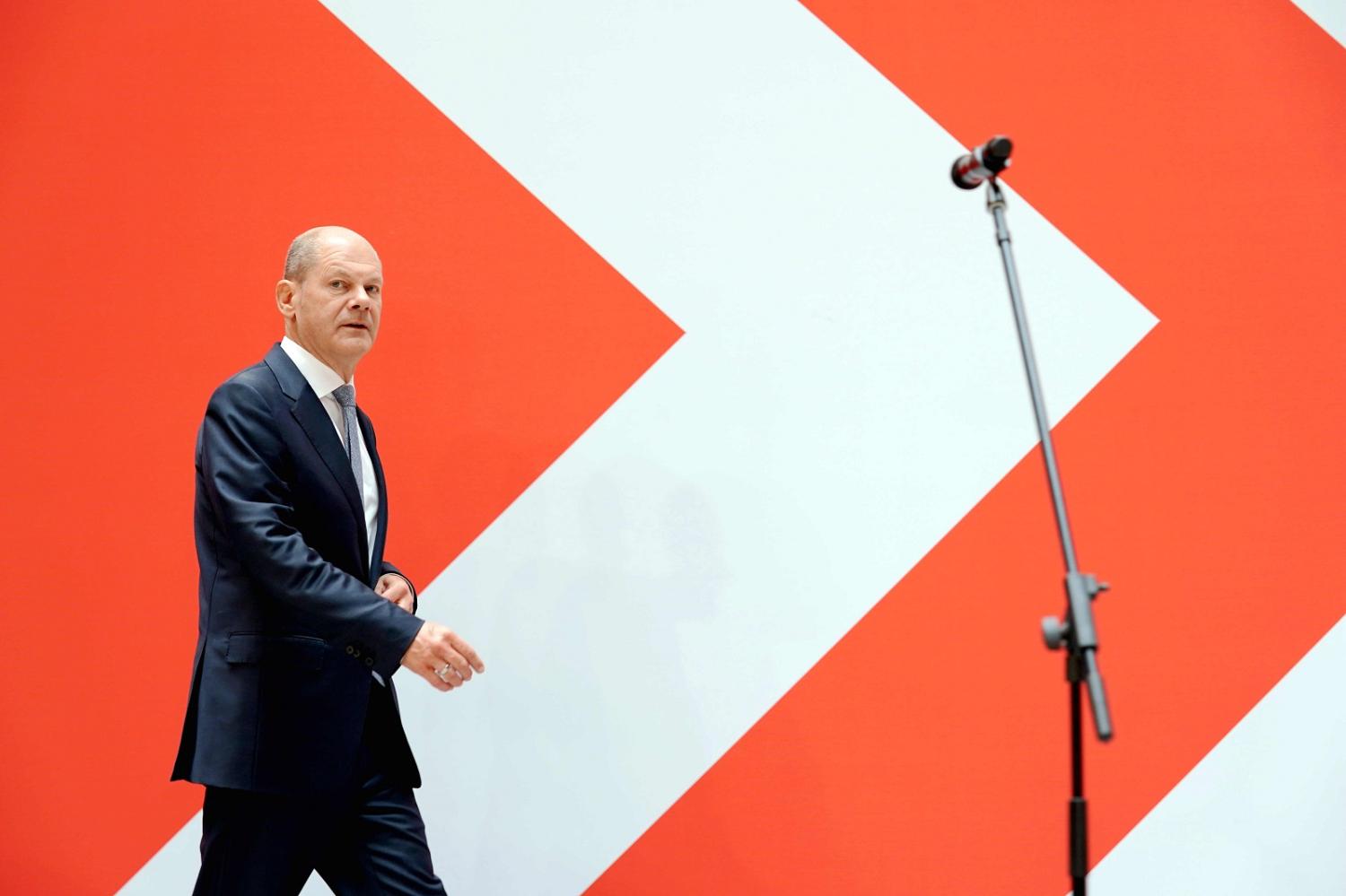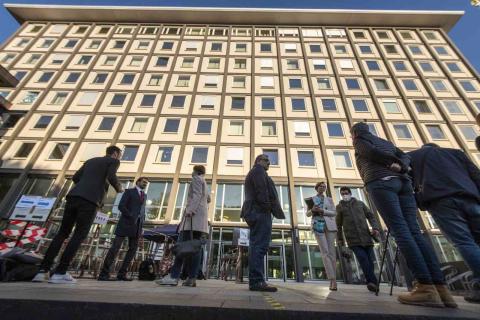“Today is essentially Christmas and a birthday in one for you, and yet you seem about as euphoric as an English butler at teatime,” remarked an astonished television interviewer to Olaf Scholz on the evening of his election as mayor of Hamburg in 2011. It was a characteristic performance by the man known as the “Scholzomat” for his mechanical, austere and laconic communication style.
Ten years later, and Scholz’ style has gained not a jot of elan. But in September’s federal election, the Scholzomat seemed to offer precisely the kind of reassuring quality the German public craved in the absence of the retiring Angela Merkel. With his Social Democratic Party (SPD) winning the election and now engaged in coalition negotiations with the Green and Liberal Parties, Scholz is almost certain to occupy Germany’s top office by year’s end.
So, who is Olaf Scholz, how did he arrive at the threshold of the Chancellery, and what sort of a leader will he be for Germany, Europe and the West?
Born in Osnabrück in Germany’s north-west, and raised in Hamburg, Scholz joined the SPD in the mid-1970s as a 17-year-old. It was a dramatic time in the party’s history. Its first post-war Chancellor Willy Brandt had just resigned following revelations that one of his closest aides was a communist spy. Brandt’s successor, Helmut Schmidt – a Hamburg man from the party’s Right – was constantly assailed by the party’s raucous left-wing for his Atlanticism and fiscal hawkishness. This was the milieu in which Scholz quickly rose to prominence in the SPD’s powerful youth wing (the Jusos) as an aggressive critic of the North Atlantic Treaty Organisation (NATO), atomic weapons and – not least – global capitalism.
Scholz wielded a highly personalised style of leadership which his aides captured in the ominous acronym “OWD”: Olaf Will Das (Olaf Wants It).
Scholz did not so much mellow with age as metamorphose into a different political beast altogether. By the time he finally entered the Bundestag in 1998, little was left – politically or physically – of the long-locked, bespectacled firebrand whose outlook had proved too radical even for the traditionally left-leaning Jusos. In the intervening years, Scholz had distanced himself from politics, working as a labour lawyer and concerning himself with workers affected by the privatisation of the old East German enterprises after German Reunification. But if the aggression and the idealism had gone, the ambition remained. Before long, he became the chair of the Hamburg SPD, in which capacity Gerhard Schröder named him as one possible Chancellor successor. A year later, Scholz was appointed Schröder’s General Secretary – an unenviable task, given the profound schism wrought through the SPD by the Chancellor’s reforms to Germany’s welfare and labour systems. Not without some historical irony, the unflappable Scholz became a foremost target of the party’s angry Left.
Schröder’s government was defeated in 2005, and the SPD became Angela Merkel’s junior governing partner. Two years later, Scholz was appointed Labour Minister, where, during the 2008 global financial crisis, he helped implement a “short-time work” program which helped Germany avoid an unemployment catastrophe. In 2011, he led the Social Democrats to victory in Hamburg, one of Germany’s 16 federal states. Buttressed by an absolute majority in the city’s parliament, Scholz wielded a highly personalised style of leadership which his aides captured in the ominous acronym “OWD”: Olaf Will Das (Olaf Wants It). Upon returning to Berlin in 2018 to take up the position of Merkel’s Finance Minister and Vice Chancellor, Scholz became the second most powerful politician in the country.

But as Scholz bathed in the international spotlight, internally he sat upon a tinder box. Weary of so many years as Merkel’s junior partner, the SPD was torn on a great number of policy issues, but above all on its participation in the “Grand Coalition” itself. Once again, Scholz was the target. And when in mid-2019 the party’s leader Andrea Nahles stepped down, years of resentments exploded to the surface. The result was Scholz’s darkest political hour. After some hesitation, Scholz, as the country’s most prominent Social Democrat, nominated himself as Nahles’ replacement. It seemed a fait accompli. But, in a coup engineered by the 30-year-old Jusos leader Kevin Kühnert, Scholz was roundly defeated by two unknowns from the party’s Left, Saskia Esken and Norbert Walter-Borjans. Their mission: destroy the Grand Coalition. Scholz’ career looked finished.
But then came Covid-19. The scale of the emergency first meant that intra-party politics fell from the headlines. And it also set the stage for Scholz to showcase his political skills. Reaching back into his repertoire, Scholz helped make the case for a new “short-term work” program. He threw money at vulnerable businesses, shattering Germany’s sacred debt rules along the way. And he broke with a long German tradition to loosen the fiscal constraints of the Eurozone in the name of economic recovery.
And yet, for all the positive attention and international prominence Scholz drew as Merkel’s Finance Minister, his party continued to suffer, riven by in-fighting, polling in the low-teens and long surpassed on the centre-left mainstream by a resurgent Green Party. The once-proud SPD was effectively dead. So when, in a gesture of reconciliation, Esken and Walter-Borjans nominated Scholz as the SPD’s new Chancellor-candidate in August 2020, hardly anybody noticed. Even fewer cared. Many within the party questioned the wisdom of nominating a Chancellor-candidate at all.
But Scholz was defiant. Hold tight, he told his party: only in the middle of the following August, when the summer vacations ended and Germans were confronted with the unwelcome reality of Merkel’s imminent retirement, would their minds finally become focussed on the principal question of the coming election: who would replace the “eternal Chancellor”? At this moment, Scholz assured the comrades, Germans would instinctively seek out the candidate who most resembled Merkel in style. Experienced, calm under pressure and gaffe-free, he would turn the Scholzomat qualities into an unassailable asset. Swathes of undecided voters would swing back to the SPD.
And swing back they did. In quick succession, the Social Democrats overtook the Greens and then Merkel’s Christian Democratic Union (CDU) in the opinion polls. The election chemistry was changed completely. The Greens quietly abandoned their hopes of capturing the Chancellery. The CDU was caught wrong-footed. What once looked like quixotic arrogance now appeared as prophetic vision.

But for all the SPD’s momentary euphoria, the coming four years will not be easy. No party in the post-war era has ever led a government with such a low proportion of the vote. Compounding the issue, some quick thinking by the two junior partners – the Free Democrats (FDP) and the Greens – to initially work as a bloc during the coalition talks, makes Scholz’ task even harder. And this is not to mention the eternal fissures within his own party. For now, all is calm in the SPD. It won’t last.
Scholz will also face a delicate balancing act in foreign policy. Here, he represents a long German establishment tradition – though certainly not the tradition he adopted in his youth. Throughout the election campaign, Scholz constantly intoned his commitment to the Atlantic alliance and NATO, disarming the far-left by reiterating that this commitment would be the foundation of any post-election coalition agreement. In Europe, he is more ambitious than Merkel, but less visionary than Emmanuel Macron. He touts the value of maintaining strong bonds with a post-Brexit United Kingdom, and has resisted the strong rhetoric on Russia and China that one hears from his coalition partners. How these stances will manifest themselves as government policy remains unclear, for it is still an open question whether Scholz will follow Merkel in retaining de facto control over foreign policy within the Chancellery, or whether the Foreign Ministry – likely to fall into the hands of the Greens – will recuperate some of the autonomy it has surrendered over the past decade or so.
The task facing Olaf Scholz is a daunting one. It will take all his considerable political skills to hammer out a coalition agreement that satisfies all three parties.
And then there’s the spectre of the past. Scholz’ zen-like exterior has proved insufficient to rid himself of a series of scandals that have burdened his long career. He is often reminded of the G20 riots that took place under his watch as Hamburg’s mayor in 2017. In 2020, he was implicated in the Wirecard affair, when an oversight body within his ministry failed to respond to early warnings in what emerged as one of Germany’s greatest fraud scandals. And questions remain about his role in the CumEx affair, in which a major Hamburg bank avoided having to pay back some €47 million in reclaimed tax to the city’s coffers.
The task facing Olaf Scholz is a daunting one. It will take all his considerable political skills to hammer out a coalition agreement that satisfies all three parties. And, of course, things might still go kaput – as they famously did in the wake of the 2017 election. But Scholz’ self-confidence in his ultimate success is undiminished. It is a quality that has carried him through no end of dark times. In early 2021, when nobody took seriously Scholz’s boasts about becoming Merkel’s successor, he was accused by a political opponent of bearing a “Smurf-like grin”. But Scholz was characteristically undaunted: “I really like that with the Smurfs. They are small, cunning and always win.”

